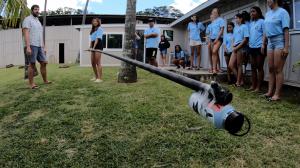Video News Release: UH hosts HS students on Moku o Loʻe (Coconut Island) for marine biology camp
University of Hawaiʻi at MānoaLink to video and sound (details below): https://go.hawaii.edu/XEj
WHAT: For a second year, two graduate students at the University of Hawaiʻi at Mānoa Hawaiʻi Institute of Marine Biology (HIMB) are running the Summer Marine Mammal Intensive Learning Experience (SMMILE) program, a fully funded overnight learning experience for 10 days on Moku o Loʻe (Coconut Island) for Hawaiʻi high school students to learn about marine mammal science in a hands-on environment.
WHEN: June 2–11, 2023
WHO: Kirby Parnell and Brijonnay Madrigal, both PhD students in the UH Mānoa Marine Biology Graduate Program, and 12 high school students from Oʻahu, Hawaiʻi Island, Maui, Kauaʻi and Molokaʻi who will be starting the 11th or 12th grade this fall 2023.
WHERE: HIMB, Moku o Loʻe in Kāne‘ohe Bay
WHY: SMMILE provides a free opportunity for underrepresented high school students to learn about marine mammal science, marine protected areas and conservation. Priority was given to Native Hawaiian and Pacific Islander high school students to improve their representation rates in STEM and the field of marine mammalogy.
OTHER FACTS:
- Participants gain basic knowledge of marine mammals, with a focus on Hawaiʻi’s marine mammals; applicable skills for studying marine mammals in the field and in human-care facilities; opportunities to network with undergraduate and graduate students, experts and organizations that participate in science-based conservation, and to learn to appreciate the diversity of Hawaiʻi’s marine mammals.
- The SMMILE program focuses on topics including: acoustics/hearing, unmanned aerial vehicles, tagging, population studies, photo ID, stranding/response and conservation/management.
- The program facilitates hands-on learning opportunities through guest lectures, hands-on training, field trips and workshops throughout the week.
- Participants are staying overnight on the island in the Lanai Suites for the duration of the program.
- SMMILE is funded by the National Marine Sanctuary Foundation, the Marine Mammal Commission, an Inclusion, Diversity, Access and Success grant from the UH Mānoa Student Equity Excellence and Diversity Office, and The Next Swell.
- The program has also received funding through a National Oceanic and Atmospheric Administration Bay Watershed Education and Training grant for the next two years (2024 and 2025).
- Hawaiian Airlines also donated flight miles for the neighboring island high school students to travel to Oʻahu.
- Hawaiʻi high schools that have students participating in SMMILE include: Kamehameha Schools Kapālama, Pearl City High School, Moanalua High School, Kealakehe High School, King Kekaulike High School, Molokaʻi High School, Kapaʻa High School, Waiʻanae High School, James B. Castle High School and Waipahu High School.
VIDEO BROLL: trt 1:36
:00 - :28 students learn about tagging whales
:28 - 1:13 students tracking a “whale” onshore
1:13 - 1:36 in the classroom
SOUNDBITES:
Brijonnay Madrigal, UH Marine Biology Graduate Program, PhD student (:15)
“SMMILE is really important for high school students because it gets them that hands on opportunity to learn about different facets of marine science. And I think engaging them early on will allow them to see potential career paths they might want to pursue in the future.”
Hulali Patacsil, Kealakehe High School on Hawaiʻi Island, incoming senior (:10)
“SMMILE has been an amazing opportunity, a bunch of once-in-a-lifetime experiences and just something I wouldn’t have got if I hadn’t joined this program.”
Caleb Collabo, Waipahu High School, incoming senior (:13)
“SMMILE connects you to a lot of different experts in the field and also exposes you to a lot of different jobs. It's also very hands-on so you get to try out and see a lot of what you learn about throughout the entire program.”
Kirby Parnell, UH Marine Biology Graduate Program, PhD student (:15)
“This program is free. We were able to get some funding from multiple different sources, federal and state grants. So it’s just a really good opportunity for our local students to get an opportunity to get introduced to marine mammal science.”
###


